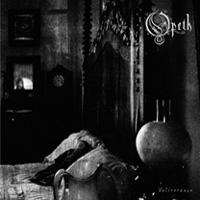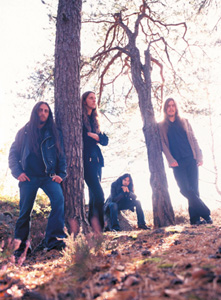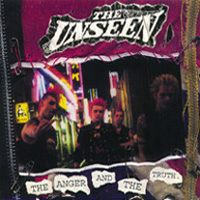 Opeth
Opeth
Deliverance (Koch)
An interview with vocalist/guitarist Mikael Akerfeldt and guitarist Peter Lindgren
by Pia Schachter
Creating music that allows one to visualize the bowels of hell is ballsy on its own. But melding the most brutal sounds with unhurried melodic sadness that leaves one filled with a belief in ourselves? Well, that, my dear, is the bravest of all. Opeth‘s newest release, Deliverance, revisits their heavy/death metal roots, while confessing a lure to the melancholy and depression that lurks within all of us. Unquestionably, Deliverance is this Death Metal Den Mother’s pick for album of the year.
If Deliverance is the brutal album and Damnation (out in March, 2003) is the mellower album, does that mean the lush and softer melodies are to be interpreted and felt as hard and foreboding?
Mikael: The actual songs on Deliverance are pretty much what we normally do. But for Damnation, it’s something very different… It doesn’t sound like anything we’ve ever done. A totally different approach to songwriting.
More like a soundtrack?
Mikael: Yeah, you could say so… It sounds like a cross between Goblin and Air. It’s very dark and melancholy.
If Damnation were to be used for a soundtrack, what type of movie do you think it would be good for?
Mikael: Some kind of B horror movie, some kind of thriller.
 The two vocal styles, I see them as characters. The growler, the sound of inner darkness, and then the melodic, elegant voice as morally sound and heroic. Do you see them as good verses evil?
The two vocal styles, I see them as characters. The growler, the sound of inner darkness, and then the melodic, elegant voice as morally sound and heroic. Do you see them as good verses evil?
Mikael: Not really. It’s just a big part of our sound now. I always choose what voice to sing in depending on what riff I’ve got underneath. I judge it for the musical taste, you could say. The lyrics don’t have meaning. They are sometimes pure nonsense, if you will. It’s not like I have characters for every kind of lyric I’ve done.
Peter, is it true as Mikael claims, that the lyrics have no meaning. That they’re pure nonsense?
Peter: I never ask him to explain the lyrics to me. If he did, it would probably ruin the sensation of reading into the lyrics for myself and what they mean to me. That’s the way I like it to be. Then I get to have my own picture of what’s going on. He wrote them in a rush. I also know for sure that they are really personal this time. Blackwater Park was personal too, but, it was about hate. Anyone who reads the lyrics can put something in them from their own point of view. I think it’s a good thing if you wonder.
Similar to when you see a video of a song that you imagined one way, and the video ruins it by showing it another way.
Peter: Exactly. That’s our intention, to not ruin it for you. There’re always several meanings to anything we do. It shouldn’t be too obvious.
Mikael, eight minutes into “A Fair Judgment” you sing “Came so close, to what I need most,” and while I hate to over-analyze that, your voice cracks and wavers, achingly so. Why? Too many cigarettes? A mistake that you knew to keep in? Or words that really mean something to you?
Mikael: Those words are very easy to relate to. It was just again a taste thing. I felt that it should be sung in that way. It was a deliberate move to make it sound weak, because of the piano and stuff underneath. The entire lyrical content of that is based on regret. I wrote the lyrics without really knowing what the regret was directed at. Anyone could interpret those lyrics to events in their own lives.
It’s important to pay tribute to those who’ve died and who we love. I notice you dedicate the record to Valborg “Bojan” Åkerfeldt.
Mikael: My grandmother. She was hit by a car. We where mixing the album when she was killed. You could say that she was like a parent to me. Very close. She was the one who got me into music in the first place. After she died, all the songs I’d written and the entire concept of these two albums had a different meaning to me.
What did she think of your music?
Mikael: I don’t think she liked it that much. But she was proud of the fact that I could sing and play guitar. She gave me my first guitar and chords books, stuff like that. Every time I visited my grandparents, she always wanted me to tune her guitar, and while I was doing that, she always recorded it. She was very proud of whatever I was doing musically. She was a painter, sculpture, stuff like that. She was very proud that somebody else in her family was interested in music, and even though she didn’t like the aggressive parts of my music, I think she really appreciated the parts where you can actually hear what I’m singing.
 When you turn a feeling into music, does that relieve and alleviate the pain of that emotion?
When you turn a feeling into music, does that relieve and alleviate the pain of that emotion?
Peter: The Opeth guys are nonaggressive people, yet our music is aggressive, dark, and sad. Maybe we are relieving something. I find that so many British bands are really aggressive as people, but their music is happy, punky stuff. Maybe they should let it out in their music.
Mikael: I wouldn’t say I am a person who’s plagued by pain. But when stuff like this with my grandmother happens, it’s obviously a relief to write lyrics like I do. It just happened by coincidence that my lyrics fit together with the mood I felt when she died. It’s also just my taste. I’m more into that kinda stuff. It’s easier for me to relate to sad matters.
After listening to your music, I need to switch to something slower, but just as deep as Opeth, I’ve put on Stevie Wonder’s Innervisions and it melts together perfectly. To me, both are tormented yet hopeful.
Mikael: I like everything he did in the ’70s, though I’m not into the Woman In Red soundtrack. Innervisions is probably one of my favorite Stevie albums. I was shocked by the song “Visions.” It’s one of those songs that you can instantly relate to and that you wish you’d written. Innervisions probably goes totally against my entire musical value. To listen to that album fills you up with happiness, almost. I don’t know what could be considered as hopeful and happy music that would effect me, apart from Stevie.
The last song on Deliverance, “By the Pain I See in Others,” introduces a new vocal style. It sounds like an underwater demon. I’ve never heard a voice like that. How did you come up with that one?
Mikael: I was writing in the middle of the night, tired, drinking coffee, and having cigarettes. Then this lyric came up. It was almost like an erotic content. The first idea for the lyrics was a dominating thing. It wasn’t me. It was so sick that I had to change it somewhat. The musical side to that song was an evil feeling, and that’s what we wanted to do with the vocals. That’s why there is that underwater thing. It sounds like a throat is slit.
Cool. Then it goes into this Kurt Weill-nightmarish/Three Penny Opera section. Like a corrupt old carnival.
Mikael: Yeah, yeah, like a circus riff. It’s weird. I like it. The first rough version of that was with no effects. It just sounded really weird. Our bass player, while he was playing it, was like “What the hell is this? What the fuck do you want to do with this?” But I had the plan to make it sound like a circus gone wrong. It worked out, really.
Do you shy away from synthesizer or synthetic sounds?
Peter: I don’t like them so much. We actually use Mellotrons. It’s like a sampler, but it’s old. We use that because all our favorite bands from the ’70s – like Motorblues and bands like that – used Mellotrons. For example: In the circus piano kinda thing, we used a grand piano and added Mellotrons on top of that. Just to make it moody. The thing I really don’t like is when metal bands add on top of a metal riff a wall of synthesizer. There are places you can use a synthesizer as an instrument, but it shouldn’t be to cover things up.
What musicians inspired you?
Mikael: Being a record collector, there are a lot of obscure bands I feel should’ve gotten a lot more recognition then they did. Nick Drake is one. No one really cared about him when he was alive. He did some fantastic music. Those three albums he did are classics. The first time I listened to them, I understood them instantly. Even though I never heard of the guy before and didn’t know he was dead. It was something in the music that went beyond the singer/songwriters of that era.
Peter, what are you listening to now?
Peter: I bought a CD today by Black Heart Procession. It’s really good in a non-metal way. It’s almost like singer/songwriter, they use a trumpet as an instrument which nobody uses nowadays. I also have been listening to an American band called 16 Horsepower. They’re really sad, dark, and depressive kind of country music. They are religious as fuck. They are so religious it turns evil almost. I really like that.
Do you find that your passion for music freaks people out, that they don’t understand why you have so much drive towards one thing?
Mikael: I don’t think musical people get freaked out, even if they don’t listen to the same kind of music. It’s more the case when I meet a person who doesn’t have a musical interest. They might look at me like I am loser. To a person who’s not interested in music, they see musicians as failed people unless they have hit the big time and have limousines, a success that they can understand. So for a struggling musician, it’s like “When are you gonna get a real job?”
Do you find sadness and darkness beautiful? That darker music makes you balanced?
Peter: I do, definitely. In an obscure way, not because it makes me sad. I can enjoy it so much because it means something to me and for the artist who has written it. It makes me happy, in an odd way. That’s probably the one thing that most attracted me to music. I don’t have many records that sound happy in my collection. I’m not a depressive person. But when it comes to music, I prefer that kind of atmosphere.
Opeth doesn’t poke fun at beauty. You don’t apologize for being soft.
Peter: We always do what we want, and we have suffered for it. When we released the first album, it was in the middle of the black metal boom. People were like “Jesus Christ, these guys have a flower on their album! There’re clean vocals and soft, cheesy parts.” We made the decision that we play and do only the music that we like. We had to suffer commercially, but after a while, people began respecting us, that we did what felt right. We don’t write or record for anybody except ourselves. That’s another reason why we don’t explain the lyrics. It’s about relieving personal inner matters through music.
(740 Broadway 7th Fl. New York, NY 10003)



